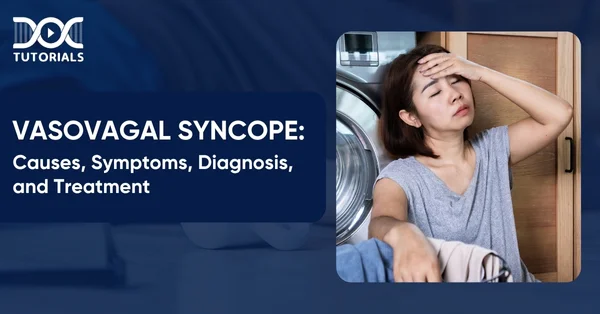Vasovagal Syncope: Causes, Symptoms, Diagnosis, and Treatment

Vasovagal syncope is a medical condition that causes brief episodes of fainting every time your nervous system overreacts to particular stimuli like stress, fatigue, pain, or even looking at needles. This overreaction lowers heart rate and blood pressure suddenly, resulting in decreased blood flow to the brain and temporary unconsciousness.
It is the most common presentation of reflex syncope, an involuntary, unconscious body response. Although usually harmless, vasovagal syncope is of clinical relevance, and having knowledge of the condition could be helpful in diagnosis and prevention, particularly in a hospital setting.
For NEET PG candidates, gaining a profound understanding of vasovagal syncope’s physiology and pathophysiology is invaluable. Not only does it reinforce fundamental principles, but it also further educates one on topics of autonomic control, cardiac physiology, and diagnostic approaches to syncope.
Interested in learning more about the subject? Read on for in-depth information!
What is Vasovagal Syncope?
Vasovagal syncope is an episode of fainting that occurs when the body reacts too strongly to external stimuli. They can be emotional distress, pain, or sight stimuli such as blood. This condition is also known as neurocardiogenic syncope.
The fainting spell is an aftereffect of the precipitation of a rapid, significant fall in blood pressure and heart rate. This decrease in blood supply to the brain results in a brief loss of consciousness.
Even though vasovagal syncope is usually not harmful and typically does not need to be treated by a doctor, there is always the possibility of injury due to a fall. Because of this, your doctor may prefer to have some tests performed to ensure that the cause is not some more risky underlying condition, such as an abnormal heart condition.
What are the Symptoms of Vasovagal Syncope?
Many individuals don’t experience early signs before fainting, but some do report specific warning symptoms. These may appear just seconds before the episode and include:
- An extremely pale or greyish colour of skin
- Crippling dizziness or lightheadedness
- Cold sweats or clamminess
- Nausea or stomach upset
- Blurred vision or tunnel vision
- Muscle weakness or unsteadiness
If you frequently notice these signs, lying flat can help restore adequate blood flow to the brain and might prevent a fainting spell.
In the aftermath of fainting, you usually regain consciousness in less than a minute. Still, post-episode symptoms may include:
- Intense fatigue
- Feeling queasy
- Continued lightheadedness
- A sense of confusion or disorientation lasting for a few minutes
What are the Causes of Vasovagal Syncope?
The cause of vasovagal syncope is an overactive reflex system stimulated by your body’s autonomic nervous system—the system that regulates automatic body functions. One of the most powerful nerves in this system, the vagus nerve, regulates such functions as heart rate and blood pressure.
When a stimulus leads to excessive stimulation of the vagus nerve, the result is an extreme reduction in heart rate and vasodilation. This leads to a sudden decrease in blood pressure, reducing oxygen supply to the brain and making one faint.
Triggers can be physical, emotional, or situational. Common causes include:
- Medical environments involving injections, such as vaccinations or blood donation
- Visually seeing blood, either one’s own or someone else’s
- Extreme stress or an overwhelming emotional experience
- Physical exhaustion, e.g., standing for long periods or exertion
How is Vasovagal Syncope Diagnosed?
Diagnosis starts with a regular physical check-up in which your physician monitors your heart rate and blood pressure. Your provider may also perform a carotid massage—a technique that gently stimulates the main arteries in your neck—to observe your body’s response.
To rule out other possible causes, particularly those related to heart health, your physician can order a number of diagnostic tests, including:
- Electrocardiogram (ECG): This test monitors the electrical currents of the heart and is able to identify irregular rhythms. Patients may be asked to wear a portable ECG for a day or even weeks.
- Echocardiogram: Images of the heart are created using sound waves and can detect structural abnormalities such as valve conditions.
- Exercise Stress Test: Taken while walking or jogging on a treadmill, this test monitors how your heart functions under stress.
- Blood Tests: Your doctor may check for underlying medical conditions like anaemia that can cause fainting.
- Tilt Table Test: Healthcare providers may recommend this test if the cause is not clearly cardiac. You lie flat on a special table, which tilts to different positions. This identifies whether a change in position affects your heart rate and blood pressure, which points towards a likely reflex cause of syncope.
What are the Treatment Options for Vasovagal Syncope?
Most people experiencing vasovagal syncope need no specific medical treatment. It might be enough to become aware of your own individual triggers and make lifestyle adjustments in order to successfully manage the condition.
However, if fainting episodes are frequent or affect your daily life, your healthcare provider may explore the following syncope treatment approaches:
- Medications: Fludrocortisone acetate may be prescribed at times to prevent recurrence. SSRIs are also utilised in select circumstances to enhance tolerance.
- Non-drug Treatments: These may involve suggestions like contracting your leg muscles when you are standing, wearing compression stockings to slow blood pooling, and increasing salt intake, as long as you do not have high blood pressure. Staying hydrated with lots of fluids and avoiding prolonged sitting, particularly in the heat or crowded areas, are also helpful.
- Surgery: In patients who have not responded to medication or lifestyle modification and still experience frequent and severe attacks, an implanted pacemaker can be used to control the heart rate.
FAQs About Vasovagal Syncope
- Is vasovagal syncope a neurological disorder?
No, vasovagal syncope is not typically caused by underlying neurological or cardiovascular illness. It is likely to be an isolated disease due to an overactive reflex.
- Can vasovagal syncope be well controlled?
Yes. You can lower your risk of fainting by drinking plenty of water, consuming a little more salt, and avoiding quick changes in position. Talk to your doctor about changing the amount of salt you consume.
- How can I lower my risk of fainting from vasovagal syncope?
Reducing exposure to known provoking factors can be highly beneficial. Examples of things to avoid are as follows:
- Being immobile for prolonged periods
- Extreme temperatures or hot environments
- Intense emotional experiences
- Sudden or severe pain
- Seeing blood or medical equipment
- Prolonged exercise
- Inadequate intake of water
- Missing meals or fasting
- How often does vasovagal syncope occur?
Vasovagal syncope is the most common and benign type of fainting. It happens to around 22% of the population, and almost 35% of all adults aged between 35 and 60 years have had at least one attack in their lifetime. Although it is benign, its effect on everyday life can be tremendous.
Conclusion
Vasovagal syncope can be frightening and can induce fear of doing daily activities or venturing outdoors. It is not, however, typically life-threatening. With the appropriate type of support, lifestyle changes, and your healthcare provider’s guidance, you are able to properly manage your condition and live a normal life without fear. Understanding the mechanisms and stimuli of vasovagal syncope not only empowers patients but also educates future health practitioners with the knowledge required to diagnose and treat such conditions confidently.
For each NEET PG candidate, it is essential to be aware of subjects such as vasovagal syncope and autonomic or cardiovascular disorders related to it. This is not only crucial for their exam preparation but also for making accurate diagnoses in clinical settings. To help achieve this objective, DocTutorials provides concise video lectures, Quick Revision Programmes (QRPs), mock tests, and high-yield study notes.Discover our NEET PG courses today and elevate your medical preparation to the next level!
Latest Blogs
-

NEET PG Exam 2025- Date, Pattern, Marking Scheme, Subject Wise Weightage, and Exam Mode
NEET PG Exam 2025 is the ultimate gateway for medical graduates aspiring to pursue postgraduate courses in medicine, including MD,…
-

INI CET Exam 2025: Your Roadmap to Success – Key Topics, Strategies, and Lessons from Last Year’s Papers
The INI CET exam is more than just a test; it’s a significant milestone for many medical students aiming to…
-

INI CET Exam Success: Previous Year Question Papers & Ultimate Guide – INI CET PYQ
One can feel overwhelmed while preparing for the INI CET (Institute of National Importance Combined Entrance Test). A vast syllabus,…




